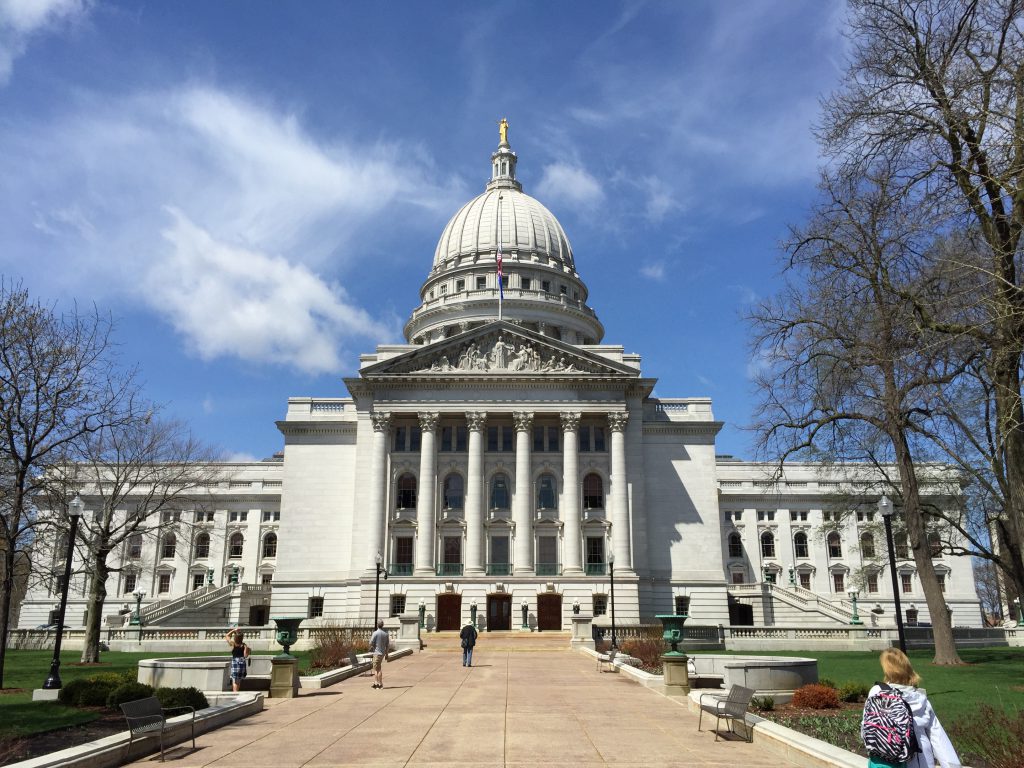Purple Wisconsin Still Has Dark Red Legislature
Republican legislators continue to win big with minority of state's vote.
Millions of dollars flowed into the Wisconsin legislative races in candidate, political party and outside spending this year. Unlike most recent elections, Democrats were competitive with Republicans, outraising them in some areas.
After all the cash was spent, Republicans picked up two seats in the Senate and lost two seats in the Assembly. The Legislature remained solidly under Republican control but the GOP did not secure sought after veto-proof majorities.
Legislative results are not always completely aligned with the top of the ticket, and a state doesn’t get much more purple than Wisconsin.
In 2016, Wisconsin leaned ever-so-slightly red by 22,000 votes for Donald Trump and in 2020 it leaned ever-so-slightly blue by roughly the same margin going for Joe Biden. In between, in a blue wave in 2018, all Wisconsin statewide offices went to Democrats including Gov. Tony Evers. Statewide races for state Supreme Court have also volleyed back and forth between liberal and conservative candidates winning.
Through all of this, control of the state Assembly and Senate has stayed solidly GOP, based on highly gerrymandered districts, as Democratic candidates have routinely received more votes — generally around 200,000 more — than their Republican counterparts when taken as a whole group statewide.
“The voters have spoken and they have returned a good conservative majority to the Legislature,” said Vos in a post election radio address Wednesday, making no mention of the Democrats’ pick-up of seats in the Assembly or of the Republicans’ failure to achieve their goal of a veto-proof majority, although he had admitted in advance of the election that it was looking less and less likely.
Assembly Democratic leader Gordon Hintz (D-Oshkosh) says that if Democrats were ever going to make major gains under the current maps, that would have happened in 2018 — a very good election for Democrats when all five statewide offices went to Democrats. But while he beat Scott Walker, Gov. Tony Evers received the majority of votes in only 36 out of 99 Assembly districts. (The same 36 Assembly Democrats won that year.)
“We have a pretty evenly divided state, so one would assume that we’d be pretty even on seats as well,” says Hintz. “Democratic districts are more concentrated — less and less spread out. When I was talking to people in the days before the election that were, perhaps, more bullish or excited or optimistic, than I was, I really reminded them that 2018 was a very good Democratic year, one of the best years nationally that we’ve had in decades and those maps held.”
That is why, Hintz says, the Democrats’ goal when they sat down with Democratic Party chair Ben Wikler early in 2020 was to form a “Save the Veto” coation. Staving off a Republican supermajority was their top goal.
It wasn’t about any one issue in particular that was the focus, because to make progress in any policy area, says Hintz, changing the maps comes first. “Until you fix partisan gerrymandering, it doesn’t really matter if you’re a healthcare person or a safety-net person or an education person. The biggest thing in the outcome of this election really was saving the veto on redistricting because of what it will mean for every other issue.”
Not surprisingly, Evers also sees protecting his ability to veto legislation as a big win.
“We were able to prevent a supermajority, which I think is beneficial for all Wisconsinites, to make sure that it’s not one party rule,” says Evers. “That said, I’m always open to having conversations with Republicans on any sorts of issues.”
Legislative geography
While a handful of votes might shift once the official canvass of the elections is complete, the seats that changed hands — plus the ones that were close — highlight Wisconsin trends that played out in the race for president as well. The changes occured in the Milwaukee suburbs moving towards Democrats and northwestern Wisconsin and around Green Bay moving toward Republicans.
The Republican pick-ups in the Senate were in the seat in Green Bay previously held for two decades by Sen. Dave Hansen who retired and in a rural northwestern district held by Democrats since Sen. Patty Schachtner won it in a special election in 2017. In the western La Crosse area, Brad Pfaff, who headed the Department of Trade, Consumer Protection and Agriculture (DAPCP) before the Senate booted him from the Evers administration, managed a narrow victory to keep that seat previously held by Democratic Senate leader Jennifer Shilling. In Congress, Rep. Ron Kind kept his seat in his western district by a far more narrow margin than previous races. Further north, Democratic incumbent Rep. Nick Milroy from Superior appears to have won his race by just around 140 votes.
In analyzing the races, former Republican Rep. Joe Handrick, who now works as Vos’ outreach director, noted on Twitter that Trump did “the same or better” in most of Wisconsin in 2020 than he did in 2016, “But his margin dropped 4% in WOW. His suburban problems are real. If his % margin remained the same in WOW, the 20,500 deficit would have been virtually zero.”
Anti-gerrymandering referenda were on the November ballot in 14 Wisconsin communities — and all 14 supported them, showing a continued public preference for nonpartisan redistricting.
“This movement to ban gerrymandering is gaining momentum among citizens across the board, and politicians who ignore it or oppose it do so at their political peril,” wrote Matt Rothschild, director of Wisconsin Democracy Campaign.
January 2021 session
Democrats have consistently criticized Republicans for not having convened the Legislature since mid-April to address the public-health crisis as the number of COVID-19 cases exploded. Nor did they come into session to respond to dramatic calls from people marching in the streets for social and racial justice in the wake of the May killing of George Floyd by Minneapolis police and then the shooting of Jacob Blake by Kenosha police in late August.
Republicans staunchly refused to meet — even when called into a special session by Evers to take up racial justice and police reforms. However, they left the door open to the possibility of meeting post-election before the official session starts next year.
Senate Republicans met on Thursday in closed caucus and chose Sen. Devin LeMahieu to replace Sen. Scott Fitzgerald who won a seat in Congress on Tuesday. Fitzgerald did not rule out a lame duck session to take up measures that the Senate never voted on in the spring after cancelling its last meeting, he told the Milwaukee Journal Sentinel in advance of the caucus. He also said it was possible the Senate would discuss whether to confirm Department of Health Services Secretary-designee Andrea Palm. Some Republicans have sought to reject Palm’s appointment which was never confirmed by the Senate.
In the Assembly, Vos broadly laid out topics his caucus will focus on in the coming session, but did not make mention of a potential lame duck session or of working with Democrats on any policies, although he did name top Democratic priorities of healthcare, education and natural resources.
“Assembly Republicans will begin the next legislative session focusing on the health and well-being of Wisconsinites,” Vos said. “We’ll help our state continue to battle the coronavirus; assist our businesses and especially the unemployed, and work hard to revive and keep the economy of our state growing strong.”
Racial justice and police reform — topics Vos has appointed a task force to study — were not mentioned, but he did echo the Republican rhetoric used by Trump in adding, “Our police will not be defunded. We’ll keep neighborhoods safe by supporting our police and finding bipartisan solutions that support law and order.”
Evers says nothing about the election or its results changed the top issues he wants to move forward on next year — and says he believes Republicans share some of the same priorities.
“I know they believe, maybe on a different level, in things that I care about … around healthcare and education and roads and other infrastructure,” Evers says. “Those are all issues that when I was elected, that people of Wisconsin indicated they wanted. So I don’t think it’s going to change the dynamics much.”
Hintz says the period after a contentious election ends and a new session begins should be “the most optimistic time.”
“You hit reset, you start over, you have an opportunity. It’s all in front of you. It should be a clean slate,” Hintz says. “Two years ago the lame duck session really ruined that before we could even get started. And as a result, we had the least productive legislative session in Wisconsin history.”
But, he notes, the next gubernatorial election is already on the horizon at the end of the coming session. “Republicans will need to decide if they want to sandbag any progress, like they’ve done the last two years. Whether we can demonstrate, at a time when the public really needs us, that we can step up and make some decisions in a bipartisan fashion, especially as it relates to managing the COVID pandemic and the economic, healthcare, education consequences of that pandemic, remains to be seen.”
Reprinted with permission of Wisconsin Examiner.





















